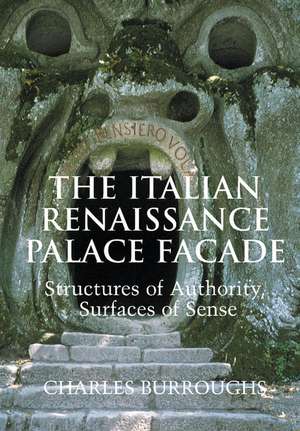The Italian Renaissance Palace Façade: Structures of Authority, Surfaces of Sense: Res Monographs in Anthropology and Aesthetics
Autor Charles Burroughsen Limba Engleză Hardback – 16 iun 2002
| Toate formatele și edițiile | Preț | Express |
|---|---|---|
| Paperback (1) | 365.04 lei 6-8 săpt. | |
| Cambridge University Press – 29 apr 2009 | 365.04 lei 6-8 săpt. | |
| Hardback (1) | 740.10 lei 6-8 săpt. | |
| Cambridge University Press – 16 iun 2002 | 740.10 lei 6-8 săpt. |
Preț: 740.10 lei
Preț vechi: 860.58 lei
-14% Nou
Puncte Express: 1110
Preț estimativ în valută:
141.61€ • 148.26$ • 117.18£
141.61€ • 148.26$ • 117.18£
Carte tipărită la comandă
Livrare economică 05-19 aprilie
Preluare comenzi: 021 569.72.76
Specificații
ISBN-13: 9780521624381
ISBN-10: 052162438X
Pagini: 310
Ilustrații: 68 b/w illus. 5 maps
Dimensiuni: 175 x 251 x 20 mm
Greutate: 0.79 kg
Ediția:New.
Editura: Cambridge University Press
Colecția Cambridge University Press
Seria Res Monographs in Anthropology and Aesthetics
Locul publicării:New York, United States
ISBN-10: 052162438X
Pagini: 310
Ilustrații: 68 b/w illus. 5 maps
Dimensiuni: 175 x 251 x 20 mm
Greutate: 0.79 kg
Ediția:New.
Editura: Cambridge University Press
Colecția Cambridge University Press
Seria Res Monographs in Anthropology and Aesthetics
Locul publicării:New York, United States
Cuprins
Introduction; 1. The forked road to modernity: ambiguities of the Renaissance facade; 2. Domestic architecture and Boccaccian drama: court and city in Florentine culture; 3. Between opacity and rhetoric: the facade in Trecento Florence; 4. The facade in question: Brunelleschi; 5. The bones of grammar and the rhetoric of flesh; 6. Setting and subject: the city of presences and the street as stage; 7. Bramante and the emblematic facade; 8. Facades on parade: architecture between court and city; 9. From street to territory: projections of the urban facade; Notes; Bibliography; Index.
Recenzii
"The strength of the book is undeniably Burroughs's methodology and sources outside the scope of traditional architectural studies, and to this end Burroughs accomplishes his goal of writing something that will bridge the gap between practical examinations of Renaissance architecture and theory." Michelle Duran-McLure, University of Montevallo, H-Net
"...no one who studies the facades of Rome and Florence will have read more widely or pack his notes more intriguingly with the latest in cultural studies and architectural theory [than Burroughs]." Renaissance Quarterly
"...a provocative look at secular, mostly domestic, facades as cultural phenomena...at once logical and idiosyncratic, a combination that recalls the speed and serendipity of discourse around a seminar table." Journal of the Society of Architectural Historians
"...Burrough's interpretive framework offers a welcome and stimulating reconsideration of many subjects." Sixteenth Century Journal, Andrew Hopkins, Villa I Tatti, Florence
"...no one who studies the facades of Rome and Florence will have read more widely or pack his notes more intriguingly with the latest in cultural studies and architectural theory [than Burroughs]." Renaissance Quarterly
"...a provocative look at secular, mostly domestic, facades as cultural phenomena...at once logical and idiosyncratic, a combination that recalls the speed and serendipity of discourse around a seminar table." Journal of the Society of Architectural Historians
"...Burrough's interpretive framework offers a welcome and stimulating reconsideration of many subjects." Sixteenth Century Journal, Andrew Hopkins, Villa I Tatti, Florence
Descriere
A theoretical and anthropological study of the Italian Renaissance Palace in the sixteenth century.










